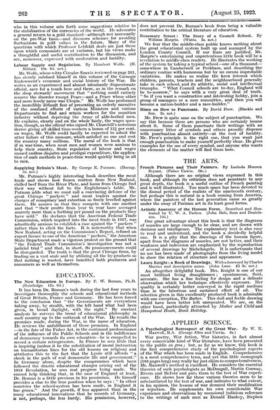EDUCATION.
The New Education in Europe. By F. W. Roman, Ph.D. (Routledge. 12s. 6d.) It has been Dr. Roman's task during the last four years to investigate thoroughly the schools and educational methods of Great Britain, France and Germany. He has been forced to the conclusion that "the Governments are everywhere taking away, by stealth, with the left hand what had been given, in broad daylight, with the right." By succinct analysis he surveys the trend of educational philosophy in each country up to the outbreak of the War. He recalls the promises made, during the War, in the name of education. He reviews the unfulfilment of those promises. In England —in the fate of the Fisher Act, in the continued predominance of the influence of the Public Schools and in the indifference of democracy towards its own education—he is cOmpelled to record a certain retrogression. In France he sees little that is inspiring (unless it be the substitution of moral instruction on humanitarian lines for the old lessons on religion) and attributes this to the fact that the Lyeee still affords "a cheek in the path of real democratic life and government." In Germany alone, despite the compromises which have followed the drastic educational changes arising out of the 1918 Revolution, he sees real progress being made. We cannot help thinking that, in the case of England at least, Dr. Roman is a little previous in his pessimism. He himself provides a clue to the true position when he says : "In other
countries the school-system has been made, in England it has grown." And the growth, if less apparent than in the
many educational innovations that he records of Germany, is not, perhaps, the less hardy. His pessimism, however, does not prevent Dr. Roman's book from being a valuable contribution to the critical literature of education.


































 Previous page
Previous page